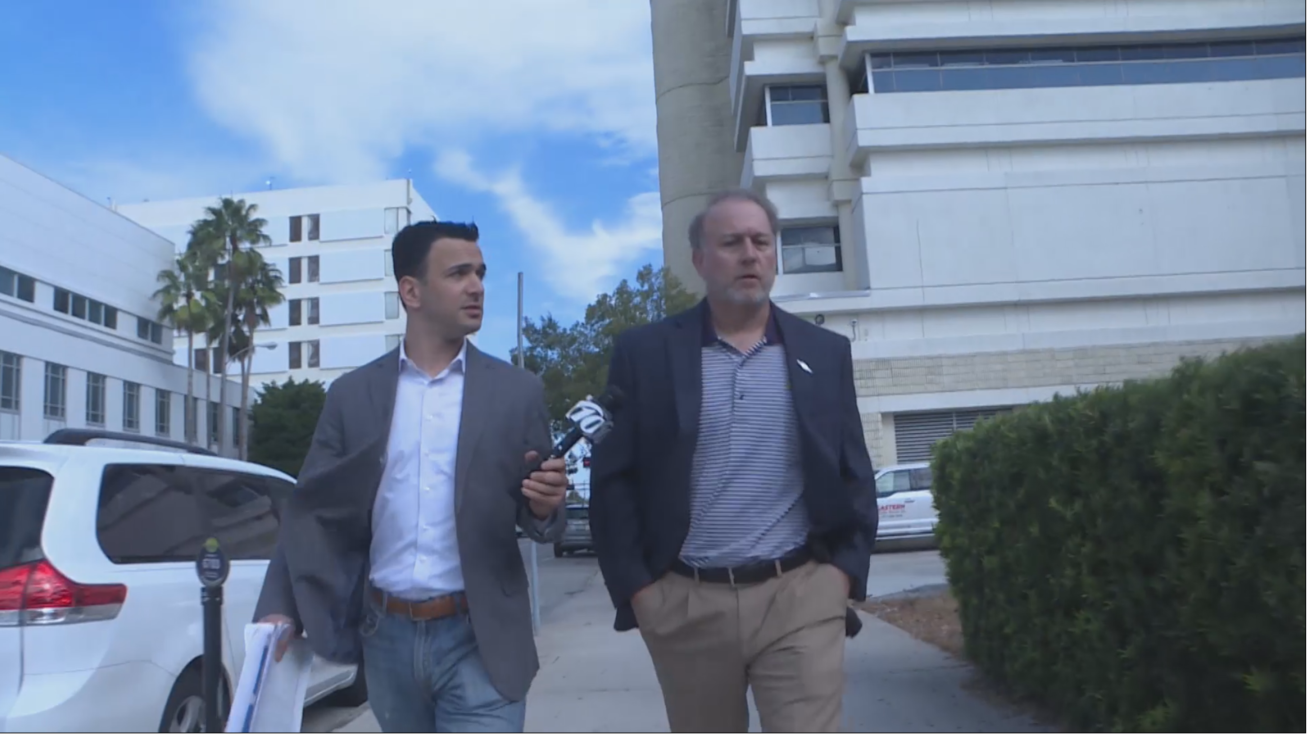TAMPA, Fla. -- Nearly two years after a unanimous vote to use county-owned cell phones as a way to preserve their text messages and other public records, most Hillsborough County commissioners are still choosing to use their personal phones for government business.
It means record retention and fulfillment of public records is left to the honor and judgment of each individual commissioner, despite indications the process may be failing constituents.
In Florida, just about any written record from public officials and employees about government business, including texts and emails, is considered a public record. It allows constituents to keep an eye on the important - and often lucrative - discussions they may not be otherwise privy to. Private devices and accounts are not exempt from the law, but those records are typically only provided on the honor of the official.
Following 10Investigates' 2015 story exposing the cozy relationship one lobbyist-political operative had with the county's top elected officials - and questions about disappearing public records - Hillsborough commissioners voted to issue county-owned cell phones in an effort to automatically archive all text messages from county officials and keep county business separate from personal business conducted on personal devices.
"It's going to be challenging, we know this, for some of us to carry two devices," said then-Commission Chairman Les Miller in January 2016. "But I think in the best interest of being transparent to the public out there, this is something we have to do."
The motion passed unanimously. Hillsborough County now spends over $200,000 a year on software and staff time to archive text messages from county phones.
However, at a series of county meetings recorded by 10Investigates cameras in August 2017, all seven commissioners were observed on their personal phones, some dozens of times each meeting. All commissioners later answered 10Investigates' questions about the phones, except Commissioner Ken Hagan.
10Investigates had to catch up with Hagan at a public appearance at the county courthouse, where he would only answer, "due to your irresponsible and misleading reporting, I have chosen not to speak to you." He repeated a version of that answer 16 times during a six-minute walk back to his office.
There are typically few clues as to the county business Hagan is discussing until it comes before the county commission for a vote. From transportation to a new Tampa Bay Rays stadium, he has a record of keeping discussions about lucrative projects out of the public light.
When asked in March by 10Investigates about his failure to use his county-issued phone, Hagan said he "needed to be better" about separating his work conversations from his personal phone. However, six months later, it was not clear if he even carried his government-issued phone with him, and a public records request for all texts sent or received on the county phone turned up zero records.
A history of transparency problems
The county phones were prompted by a 2015 10Investigates series exposing how Commissioners Sandy Murman and Ken Hagan said a series of requested public records "didn't exist," only to produce some them later when threatened with a lawsuit. The Hillsborough County Sheriff's Office also concluded numerous commissioners failed to keep text messages that several watchdogs suggest should have been saved as public records:
"After seeing the pattern of communication specifically around the (time of Leytham's firm landing a lucrative county contract), Investigators attempted to obtain any deleted text messages from the cellphones of (lobbyist and political operative Beth) Leytham, Commissioners Ken Hagan and Sandra Murman, and Mayor Bob Buckhorn. Investigators asked each person if they still possessed the cellphone they used during the 2014 time period. All four advised they had upgraded their cellphones, and no longer possessed them."
Hagan later made the official motion in January 2016 to adopt the new county policies on phones, including new devices for all commissioners, suggesting it would help "fix" the county's public records "failures" related to his text messages.
"We owe it to the public to be as transparent and responsive as possible," Hagan said at the time. "I think this policy will go a long way to achieve that."
Commissioners also agreed to increase their public records training, and the county attorney's office provides each member - at least once a year - reminders of state laws and local policies. According to the county attorney's office, "commissioners have been trained that any communication of official county business that happens to occur on their private devices must be forwarded to their county email address."
It's clear not all commission members heed the warnings.
The 10Investigates stories also led to a series of state ethics investigations related to Leytham's relationships with elected leaders. After two years, those cases are expected to be closed this coming Friday, due to the lack of probable cause. If the state ethics commission agrees to drop the case, it will be a more successful result for Hagan than in 2014, when he was fined for failing to disclose certain personal finances on his state filings.
When 10Investigates followed up with each commissioner regarding text messages in 2017, many of the board members told 10Investigates they don't text about county business much. But texts, sent by commissioners, obtained from other public employees suggest most of them are regular texters from their personal phones.
Unused cell phones
Only two of seven commissioners were observed by 10Investigates using their county-issued phone, which auto-archives all text messages for anyone who should request them.
Les Miller, who was the chairman of the commission when the board voted to issue members phones, carries two phones and has an outgoing voicemail message on his personal phone that directs anyone calling about county business to call his office instead. He says his phone activity during commission meetings is usually limited to checking in on his family.
Pat Kemp, who was the only current commissioner who was not on the board when the reforms were passed, also carried two phones with her to recent commission meetings. She responded to a reporter's text message on her personal phone with a request the conversation continue on the work phone.
However, the five other commissioners, as well as County Attorney Chip Fletcher, seem to prefer using their personal phones for county business.
Hagan was observed on his personal phone frequently during a recent meeting, but his office said "no records exist" when all government-related texts from that meeting were requests. They also said "no records exist" when all texts in August related to a new Rays stadium were requested, even though 10Investigates had sent a pair of texts, which would qualify as public records, to Hagan's personal phone in August regarding a new Rays stadium.
After 10Investigates finally caught up with Hagan in late September and the commissioner claimed "you get every public record that you've requested," his office provided several new, unreleased text messages.
County Commissioner Sandy Murman turned over some messages from her personal phone, sent during the observed meetings, regarding items on the agenda. Her office also told 10Investigates the commissioner forwards emails and texts from her personal device to her county email account, in accordance with the county attorney's recommendations, to ensure the messages are properly archived.
Commissioner Stacy White says he seldom has time to text during meetings as the board's chair, other than an occasional check-in with family. Personal texts are not subject to public records laws. But White says he makes the effort to save any texts on his personal phone related to county business.
Commissioner Victor Crist turned over the most texts and emails from his personal phone, and even as far back as 2015, demonstrated an understanding of public records laws on personal devices, sharing some exchanges with 10Investigates and forwarding others to his county accounts for archiving.
County Commissioner Al Higginbotham is the only commissioner who declined the county-issued phone, saving the county approximately $30 per month. He says he rarely text messages, and when he does, he sends a screenshot of the message to the county attorney's office. Higginbotham said most of his phone activity during commission meetings is checking news feeds and tweets from reporters covering the meeting.
County Attorney Chip Fletcher is frequently on his phone during commission meetings, but said most of his communications during meetings are with his wife and daughter. He says he takes screenshots to save any potential government texts that come into his personal phone. Back in 2015, he said he excused some of the commission's record deletion because the texts may have been "transitory in nature," and thus, not subject to public record laws. But in January 2016, he recommended the board "either not communicate using text message for county business, of if there's a need to do that, to use predominately the county-issued phone so that they're automatically archived."
Only County Administrator Mike Merrill and members of his communications team seemed to prefer county-issued cell phones over personal devices. As a result, the county has a record of the dozens of text chains Merrill had in August with board members, staffers, and citizens interested in board dealings.
The county reports spending $166,080 annually on software to archive text messages, plus $64,406 in staff cost to manage cell phones. Commissioners are among the 2,505 employees who have county-issued phones, which cost the county approximately $900,000 per year, or $30 per phone per month.
Ken Hagan's pushback
Hagan said his refusal to speak to 10Investigates was due to "irresponsible and misleading reporting." He wouldn't elaborate.
In addition to exposing his business and political relationship with lobbyist Leytham, 10Investigates has also shined a light on the following stories involving Hagan:
- How he’s flip-flopped on the topic of tax money for a new Rays stadium
- How he's avoided transparency and regional collaboration through years of negotiations with the Rays
- How he wouldn't disclose how he's using free tickets to local sporting events
- How he helped direct film incentives to a campaign supporter
- How he made wildly inaccurate economic impact claims about taxpayer-subsidized sports events
- How he mislead on the different things the county's tourist tax could help fund
Hagan told 10Investigates he would speak to a different 10News reporter, but when one requested an interview with the commissioner, his office declined and instead sent a statement that read - in part - "While it may not be a preferred way to communicate, the County Attorney’s Office has consistently advised that there is nothing improper or unlawful with using personal cellular phones to conduct county business."
“To the best of my knowledge, we have satisfied WTSP’s numerous public records requests. As you can see from the few responsive messages, I prefer to communicate telephonically or in a public meeting.”
Find 10Investigates' Noah Pransky on Facebook or follow his updates on Twitter. Send your story tips confidentially to npransky@wtsp.com.
Click here to load this Caspio Cloud Database
Cloud Database by Caspio


